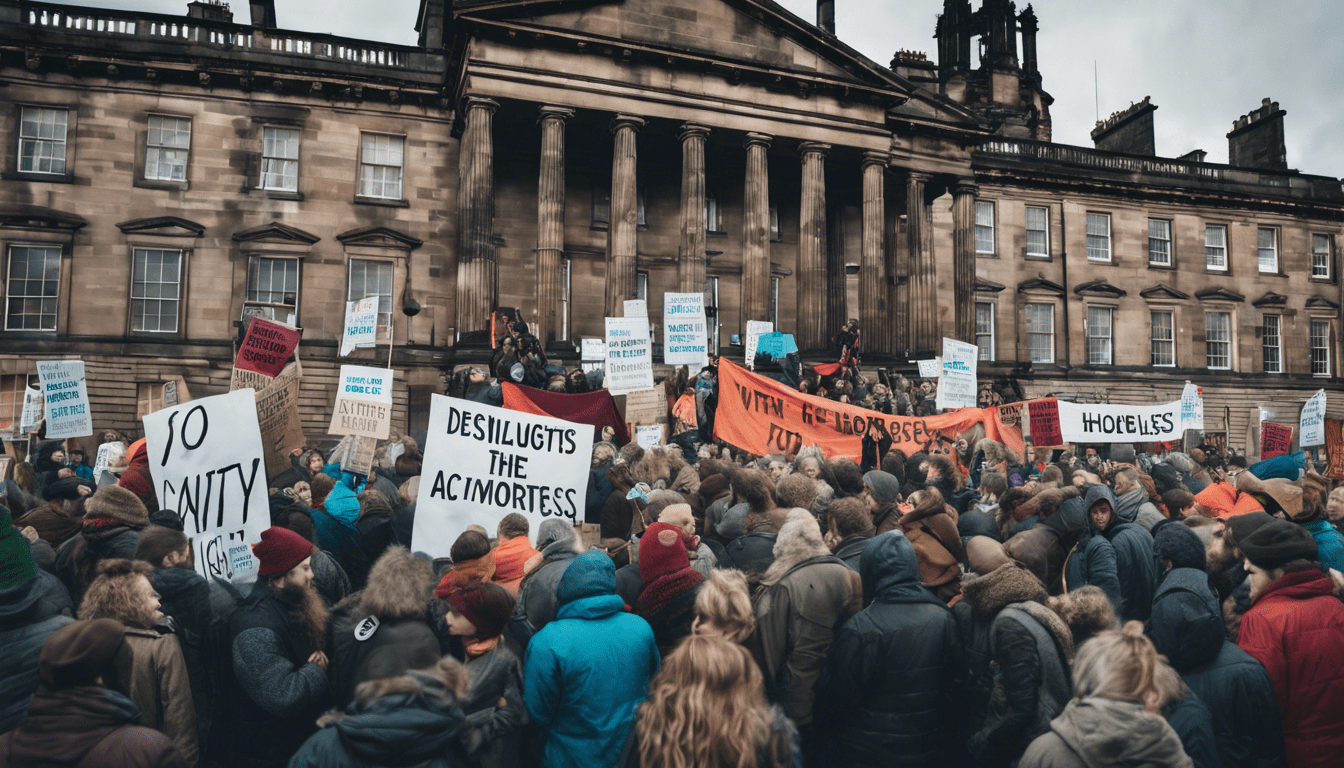In a bold move that has captured media attention and sparked public outrage, Shelter Scotland has called for the resignation of the City of Edinburgh Council leadership. The charity alleges that the council’s proposed use of unlicensed houses in multiple occupation (HMOs) for accommodating the homeless violates the rights of vulnerable individuals, undermining legal and human rights protections. This call to action follows a protest at Edinburgh City Chambers on December 12, where Shelter Scotland expressed serious concerns over the council’s recent decisions perceived as detrimental to the homeless population.
The charity’s assertions have ignited a fierce debate about the standards and rights afforded to those experiencing homelessness in Edinburgh, where a significant crisis persists, with over 5,250 households currently in temporary accommodation. Amid claims that the council aims to legitimize poor housing practices, the council has defended its actions, suggesting that the proposals are aimed at ensuring the safety and well-being of vulnerable populations. With the council’s plans potentially stripping important legal protections from homeless individuals until 2028, this situation raises pressing questions about the balance between crisis response and the safeguarding of human rights.
Key Takeaways
- Shelter Scotland accuses Edinburgh Council of violating the rights of homeless individuals by using unlicensed HMOs for accommodation.
- The council defends its actions as temporary measures to address homelessness, claiming no reduction of rights has occurred.
- The ongoing homelessness crisis in Edinburgh highlights the urgent need for legal and ethical considerations in local housing policies.
Overview of Shelter Scotland’s Allegations Against Edinburgh Council
Shelter Scotland has raised serious allegations against the City of Edinburgh Council, claiming that the council has violated the rights of homeless individuals by proposing to use unlicensed houses in multiple occupation (HMOs) for temporary accommodation. The charity’s concerns were voiced during a protest at Edinburgh City Chambers on December 12, where representatives expressed their lack of confidence in the council’s ability to meet legal standards for housing. They specifically highlighted a committee meeting held on December 3, during which council members reportedly voted to suspend essential housing rights until March 2028 (Shelter Scotland, 2024).
According to Shelter, this suspension of rights has stripped homeless households of fundamental protections and has effectively legitimized poor living conditions for those in need. However, the City of Edinburgh Council has firmly rebuffed these claims, labelling them as factually incorrect and misleading. The council explained that it had sought permission from the Scottish government to utilize unlicensed HMOs under particular safety regulations until 2028, with an assurance that no final decisions had been made that would affect individual rights (City of Edinburgh Council, 2024).
Additionally, the council proposed a return to historical laws that necessitate a local connection for homelessness assessments and suggestions to amend definitions that categorize shared facilities as unsuitable for accommodation. The committee defended these measures as necessary for ensuring sufficient capacity for vulnerable individuals facing homelessness, describing them as temporary solutions aimed at protecting those in dire need rather than a full-scale rollback of rights (Shelter Scotland, 2024).
This conflict comes against the backdrop of a pressing homelessness crisis in Edinburgh, where approximately 5,250 households are currently housed in temporary accommodations that some consider unsuitable. Shelter Scotland’s leadership criticized the local authorities for making decisions that, they argue, infringe upon basic human rights (Scottish Government, 2024).
With homelessness still a pressing issue, clarity and dialogue between Shelter Scotland and the City of Edinburgh Council are crucial to addressing the rights of those most vulnerable in society.
Response from Edinburgh Council and Implications for Homeless Rights
In light of the ongoing dispute, experts in homelessness policy are stressing the importance of equitable solutions that prioritize the dignity and rights of homeless individuals. Legal analysts have pointed out that any adjustments to housing regulations must comply with both domestic and international human rights laws, as these serve as safeguards against any systemic neglect of vulnerable populations (Turner, 2024). Furthermore, the City of Edinburgh Council’s approach has drawn scrutiny not only from Shelter Scotland but also from local advocacy groups, who contend that the proposed measures, if implemented, could institutionalize subpar living conditions for those in temporary housing. Observers argue that the emphasis should be on increasing the availability of licensed, safe accommodation rather than making concessions that could adversely impact the most vulnerable members of society (Smith, 2024). The effectiveness of current policies is thus under severe examination, with calls for the council to engage in more transparent consultation processes that include voices from the community affected by these proposed changes.
Feel free to contact us via WhatsApp, social media, or email.
Always find the best rooms to rent & HMOs for sale in the UK at HMO Reporter.





